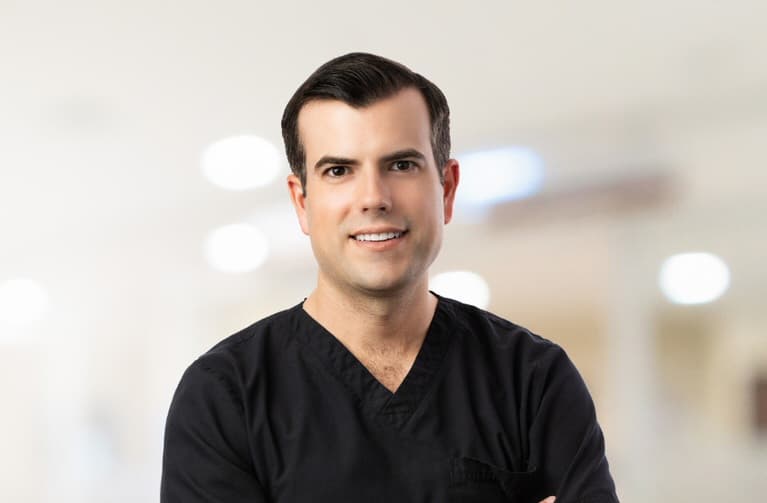Houston Dermatology Specialists
13114 FM 1960 Rd W, Suite 119
Houston, TX 77065
Phone: (713) 487-8233
Monday–Friday: 8 a.m.–4 p.m.
Skin Cancer Screening Near Houston
At Houston Dermatology Specialists in Cypress, Texas, double board-certified dermatologist and Mohs surgeon Christopher Downing, M.D., FAAD, and his team provide skin cancer screenings and treatment. Skin cancer is the most common cancer in the U.S., but it is often preventable with the right precautions and dermatological care.
We offer regular screenings and mole checks, as well as guidance on skin cancer prevention. If you do develop skin cancer, we will help you treat it as early and effectively as possible.
Who’s the most at risk for developing skin cancer?
Patients with certain characteristics are at greater risk for developing skin cancer. For example, men and women with light-colored eyes, red or blond hair, and fair complexions are at increased risk of developing skin cancer. In addition, those who work outdoors or have higher exposure to UV rays without adequate protection are at greater risk. Certain genetic or inherited traits can also predispose patients to skin cancer.
What are the most common types of skin cancer?
Basal cell carcinoma (BBC) and squamous cell carcinoma (SCC) are the most common types of skin cancer. BCC typically looks like a flesh-colored round growth, pearl-like bump, or pinkish skin patch. SCC often looks like a red, firm bump, a scaly patch, or a sore. Melanoma, the third most common type of skin cancer, has the most tendency to spread. Melanoma can develop within a mole that you already have on your skin or appear suddenly as a dark spot on the skin. You should contact our skin cancer specialists right away if you detect these symptoms.
The Importance of Regular Skin Cancer Screenings
The American Academy of Dermatology recommends having your entire body checked for any suspicious moles, lesions, or signs of skin cancer at least once a year. Identifying issues as early as possible allows for effective treatment before the cancer has a chance to grow or spread.
During screenings, a dermatoscope is used to get an up-close look at any concerning moles or lesions. This device illuminates and magnifies to provide a detailed view of areas on the skin and nails. We use this to deliver an accurate diagnosis and carefully monitor any changes in suspicious areas over time.
If an area of concern is identified, we will recommend a biopsy to confirm the diagnosis.

Your Partner in Skin Health
Dr. Christopher Downing is a double board-certified dermatologist and fellowship trained Mohs surgeon serving the Cypress and Houston communities. He trained for years to provide his patients the best in dermatological care. His mission for establishing Houston Dermatology Specialists was to create a practice in which delivering professional, conscientious, and personalized care for patients is the #1 priority.
Meet Dr. DowningHow To Prevent Skin Cancer
Wear Sunscreen
Wear a water-resistant broad-spectrum sunscreen of SPF 30 or higher whenever you spend time outside, even on cloudy days. Reapply it every 2 hours.
Cover Up With Clothing
Cover as much of your body as possible with lightweight layers and choose items with an ultraviolet protection factor (UPF), which will be noted on the label. Add a wide-brimmed hat and UV-protective sunglasses.
Check the UV Index
The UV index indicates how strong the sun’s rays are in an area at any given time. Avoid spending time in the sun when the index is high in your area. UV levels are typically highest between 10 a.m. and 4 p.m.
Avoid Tanning Beds
Tanning beds deliver UV rays that are as harmful as sun exposure. Consider using sunless tanning products instead.
Perform Monthly At-Home Checks
Between your annual visits, check your skin regularly for any moles or lesions that display the ABCDEs of melanoma:
- Asymmetry: One half is unlike the other half.
- Border: The area has an ill-defined border.
- Color: There are varying colors, which may include black, brown, red, and blue.
- Diameter: The area is larger than 6mm, or the size of a pencil eraser.
- Evolving: The spot changes size or shape over time.
What happens if you are diagnosed with skin cancer?
Dr. Downing and his team will recommend the most effective treatment for your diagnosis. As a double board-certified dermatologist and fellowship-trained Mohs micrographic surgeon in Cypress, Dr. Downing has special expertise in Mohs surgery, a technique with a cure rate of up to 99%. This procedure is performed in his office under local anesthesia.
How often should I get screened for skin cancer?
We recommend being screened for skin cancer at least once a year or more frequently if you are at a higher risk.
Is Mohs surgery the best treatment option for skin cancer?
Dermatologists usually consider Mohs surgery the most effective technique for treating many basal cell carcinomas and squamous cell carcinomas. It is considered highly effective because it spares healthy tissue and has the highest cure rate.
Does sunscreen really help prevent skin cancer?
Yes! Studies show that regular use of sunscreen, when used as directed, can decrease your chance of developing certain common skin cancers by as much as 40% to 50%.
Request Your Skin Cancer Screening Near Houston Consultation
To meet with Dr. Downing and his team, please request a consultation online or give us a call at (713) 487-8233. We look forward to meeting you.

